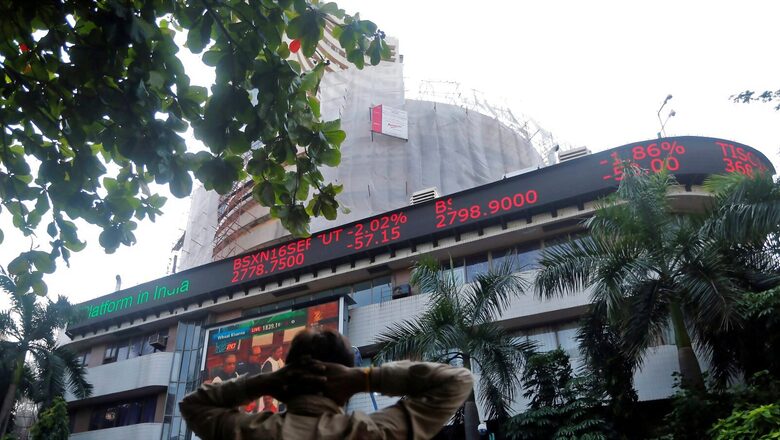
views
Key Benchmark Indicies declined 2 per cent on Thursday tracking losses in global markets. This came on the heels of the central bank minutes released on May 18 that spooked investors, flamed interest rate hike concerns, and corporate earning. The mood in Asia soured further after Chinese internet giant Tencent plunged on weak earnings. Marketmen fear earning downgrade cycle ahead, something which the market has ignored till now. Benchmark BSE Sensex sank around 1,200 points to an intraday low of 52,896, and the NSE Nifty 50 tanked over 300 points to 15,903. The broader markets were also weak in line with frontline indices. The India VIX surged 9 per cent to 24 levels indicating high nervousness amid investors.
Sectorally, all indices thrashed in trade with the Nifty IT bleeding the most by over 3 per cent. Besides, the Nifty Metal and Nifty Media also sunk over 2 per cent each. Meanwhile, broader markets traded tepid as Nifty Midcap 100 shed over 2 per cent and Nifty Smallcap 100 dipped over 1 per cent.
What is Spooking the D-Street Today?
Weak Q4 Hit Wall Street
Wall Street indices tumbled on Wednesday as Dow Jones shed 3.2 per cent, S&P 500 traded lower by 3.6 per cent, and Nasdaq Composite slipped 4.3 per cent. The sharp plunge came after growth shares reversed rally as shares of US retail giant Target fell 25 per cent to $162 in trade, the biggest fall seen since October 19,1987.
Naveen Kulkarni, chief investment officer, Axis Securities, said: “US Markets were red on Wednesday due to big earnings misses by target and major retailers which also stoked investor’s fears that surging inflation might decrease profits.”
Asian Markets Hurt
Asia-Pacific markets tracked the steep selloff in US markets on Thursday as investors fret over rising inflation and Ukraine war. Hong Kong’s Hang Seng index fell 2.25 per cent whereas shares of Chinese tech behemoth Tencent plunged over 6 per cent after report weak earnings call. Meanwhile, Nikkei 225 fell 1.75 per cent, South Korea’s Kospi dropped 1.34 per cent and Austalia’s ASX 200 slipped 1.61 per cent.
Rate Hike, Inflationary Woes Led Sell-off
Parth Nyati, founder, Tradingo, said: “Global inflation has become the biggest spoilsport and has derailed the economic growth recovery globally. The post-pandemic inflation which was once believed to be transient has now become an entrenched one. Inflation rates are at a 40-year high in countries like the UK, and USA. The American retail majors Walmart and Target have disappointed on the Q1 earnings front, indicating that even large companies are unable to cope with the supply chain and inflationary woes. This has created a huge sell-off and meltdown in the majority of the stock markets globally.”
Record Low Rupee & Foreign Outflows
Record low rupee is weighing on foreign flows into the country. The partially convertible rupee stood at 77.6780 against the greenback and traded near all-time low levels.
A weakening rupee makes investments in Indian equities unattractive to foreign investors. Foreign equity outflows in May have topped Rs 30,000 crore mark. For 2022, they stood at Rs 1,57,556 crore so far in 2022.
What Should Investors Do?
Going forward, analysts believe that markets will continue to remain on the edge in the near-term over fears of recession and prospects of aggressive monetary tightening by the US Federal Reserve (US Fed).
So, talking about the investor strategy in this highly volatile market environment, Mohit Nigam, head – PMS, Hem Securities, said: “In scenarios of increasing market volatility, especially when stock prices are declining, many investors get into panic mode and may feel urge to sell everything. Market volatility is unavoidable and investors need to keep their emotions under control in these volatile markets. We believe the best solution is to focus on long term investments and ignore short-term fluctuations. A market correction may be very rewarding in the long term. One should keep a balance between sectors styles and keep investing in a staggered manner as timing the market perfectly is nearly impossible.”
Conventional wisdom says risk-averse investors should stay way from volatile markets. “The average investor should not try to time the market in these volatile times. A systematic investment plan making regular monthly investments in a set of fundamentally strong large-cap and mid-cap companies (10-15) giving good sectoral exposure is advisable. To some extent, we prefer IT, Pharma, Real Estate and Consumer durables,” said Abhimanyu Kasliwal, Choice Equities.
Read all the Latest Business News here



















Comments
0 comment